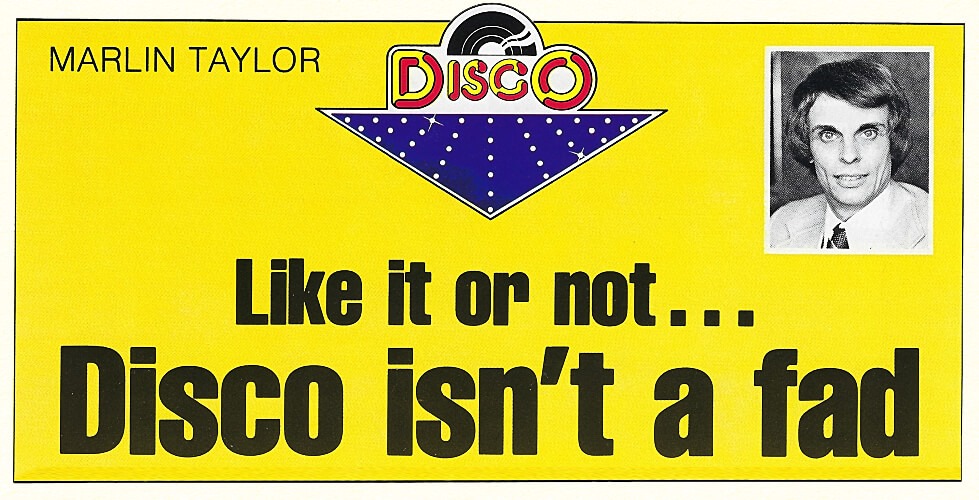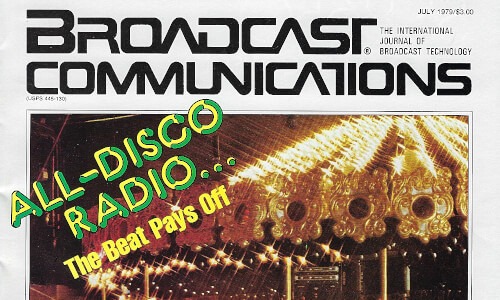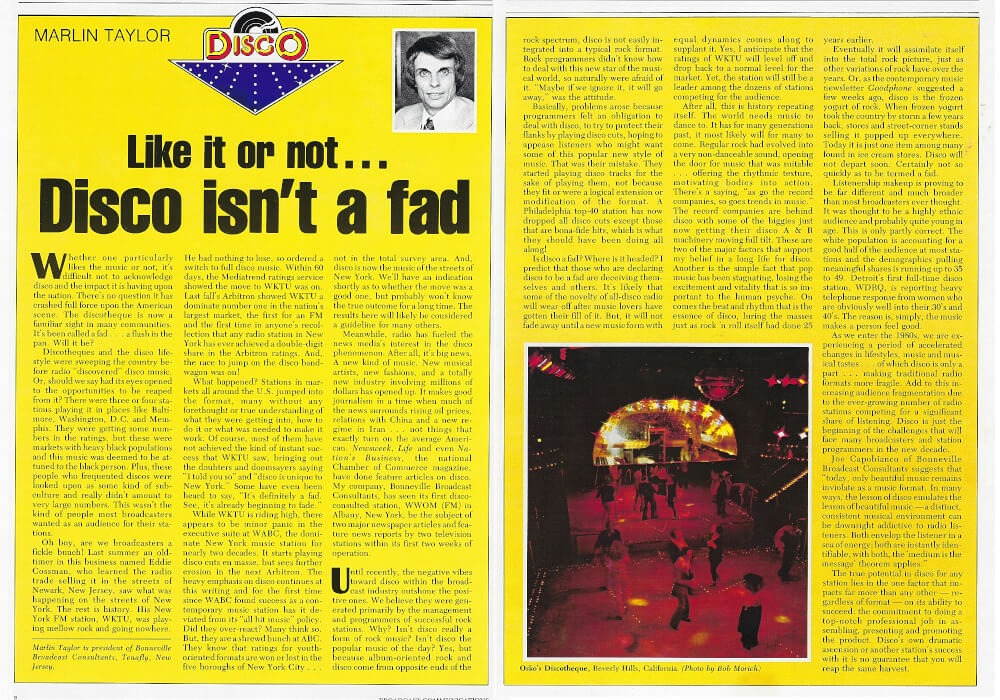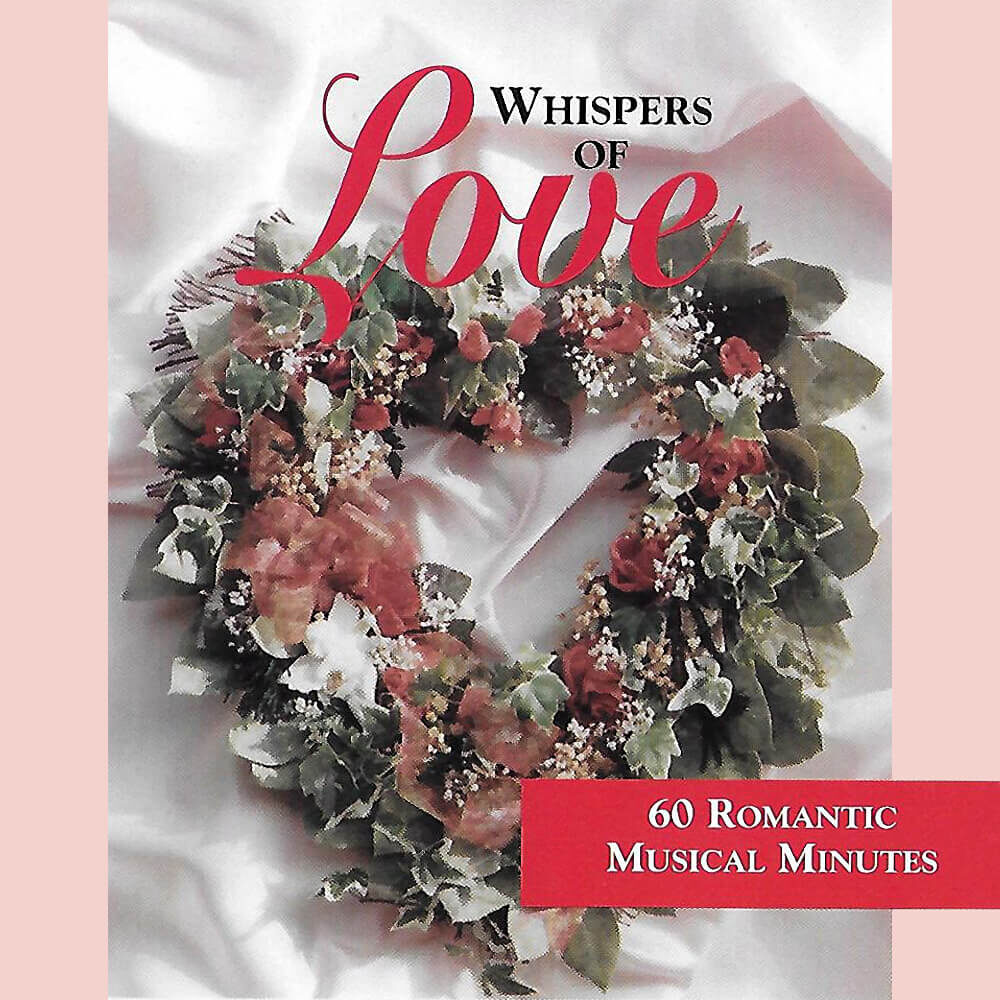In their July of 1979 issue, a now long-defunct industry magazine named Broadcast Communications published an article under the above headline. It was written by yours truly at their request. The big mystery which remains today is why I, while being a professional radio programmer, was asked to write on this genre, one that I had no involvement with or real knowledge of — although I did find myself listening to it on radio and enjoying the rhythms and beat.
The disco music — so named because the dance clubs in New York and across the nation where the music was being danced to by crowds of well-dressed dancers were called discotheques — format had only been on New York FM station WKTU for just a year when this article was published and was flying high in audience ratings.
While the first disco-formatted station in the nation was WKYS in Washington, D. C., began in late 1975 under the tutelage of radio programming consultant Bob Henabery — who’s considered the “father” of the format — it did not catch the attention of the industry until WKTU’s launch on that July evening in 1978! As Bob Shannon writes in his book, Turn It Up! … Bob Henabery had recommended the format to WKTU management in 1975, but Eddie Cossman — who I mention in my article and knew personally — didn’t buy the concept at that time.
Here’s my 1979 article … after which we’ll have some observations provided by the 40 years which have passed since then:

Whether one particularly likes the music or not, it’s difficult not to acknowledge disco and the impact it is having upon the nation. There’s no question it has crashed full force upon the American scene. The discotheque is now a familiar sight in many communities. It’s been called a fad … a flash in the pan. Will it be?
Discotheques and the disco life-style were sweeping the country before radio “discovered” disco music. Or, should we say had its eyes opened to the opportunities to be reaped from it? There were three or four stations playing it in places like Baltimore, Washington, D.C. and Memphis. They were getting some numbers in the ratings, but these were markets with heavy black populations and this music was deemed to be attuned to the black person. Plus, these people who frequented discos were looked upon as some kind of sub-culture and really didn’t amount to very large numbers. This wasn’t the kind of people most broadcasters wanted as an audience for their stations.
Oh boy, are we broadcasters a fickle bunch! Last summer an old-timer in this business named Eddie Cossman, who learned the radio trade selling it in the streets of Newark, New Jersey, saw what was happening on the streets of New York. The rest is history. His New York FM station, WKTU, was playing mellow rock and going nowhere. He had nothing to lose, so ordered a switch to full disco music. Within 60 days, the Mediatrend ratings service showed the move to WKTU was on. Last fall’s Arbitron showed WKTU a dominate number one in the nation’s largest market, the first for an FM and the first time in anyone’s recollection that any radio station in New York has ever achieved a double-digit share in the Arbitron ratings. And, the race to jump on the disco bandwagon was on!
What happened? Stations in markets all around the U.S. jumped into the format, many without any forethought or true understanding of what they were getting into, how to do it or what was needed to make it work. Of course, most of them have not achieved the kind of instant success that WKTU saw, bringing out the doubters and doomsayers saying “I told you so” and “disco is unique to New York.” Some have even been heard to say, “It’s definitely a fad. See, it’s already beginning to fade.”
While WKTU is riding high, there appears to be minor panic in the executive suite at WABC, the dominate New York music station for nearly two decades. It starts playing disco cuts en masse, but sees further erosion in the next Arbitron. The heavy emphasis on disco continues at this writing and for the first time since WABC found success as a contemporary music station has it deviated from its “all hit music” policy. Did they over-react? Many think so. But, they are a shrewd bunch at ABC. They know that ratings for youth-oriented formats are won or lost in the five boroughs of New York City … not in the total survey area. And, disco is now the music of the streets of New York. We’ll have an indication shortly as to whether the move was a good one, but probably won’t know the true outcome for a long time. The results here will likely be considered a guideline for many others.
Meanwhile, radio has fueled the news media’s interest in the disco phenomenon. After all, it’s big news. A new kind of music. New musical artists, new fashions, and a totally new industry involving millions of dollars has opened up. It makes good journalism in a time when much of the news surrounds rising oil prices, relations with China and a new regime in Iran … not things that exactly turn on the average American. Newsweek, Life and even Nation’s Business, the national Chamber of Commerce magazine, have done feature articles on disco. My company, Bonneville Broadcast Consultants, has seen its first disco-consulted station, WWOM (FM) in Albany, New York, be the subject of two major newspaper articles and feature news reports by two television stations within its first two weeks of operation.
Until recently, the negative vibes toward disco within the broadcast industry outshone the positive ones. We believe they were generated primarily by the management and programmers of successful rock stations. Why? Isn’t disco really a form of rock music? Isn’t disco the popular music of the day? Yes, but because album-oriented rock and disco come from opposite ends of the rock spectrum, disco is not easily integrated into a typical rock format. Rock programmers didn’t know how to deal with this new star of the musical world, so naturally were afraid of it. “Maybe if we ignore it, it will go away,” was the attitude.
Basically, problems arose because programmers felt an obligation to deal with disco, to try to protect their flanks by playing disco cuts, hoping to appease listeners who might want some of this popular new style of music. That was their mistake. They started playing disco tracks for the sake of playing them, not because they fit or were a logical extension or modification of the format. A Philadelphia top-40 station has now dropped all disco cuts except those that are bona fide hits, which is what they should have been doing all along!
Is disco a fad? Where is it headed? I predict that those who are declaring disco to be a fad are deceiving themselves and others. It’s likely that some of the novelty of all-disco radio will wear off after music lovers have gotten their fill of it. But, it will not fade away until a new music form with equal dynamics comes along to supplant it. Yes, I anticipate that the ratings of WKTU will level off and drop back to a normal level for the market. Yet, the station will still be a leader among the dozens of stations competing for the audience. After all, this is history repeating itself. The world needs music to dance to. It has for many generations past, it most likely will for many to come. Regular rock had evolved into a very non-danceable sound, opening the door for music that was suitable … offering the rhythmic texture, motivating bodies into action. There’s a saying, “as go the record companies, so goes trends in music.” The record companies are behind disco with some of the biggies just now getting their disco A & R machinery moving full tilt. These are two of the major factors that support my belief in a long life for disco. Another is the simple fact that pop music has been stagnating, losing the excitement and vitality that is so important to the human psyche. On comes the beat and rhythm that is the essence of disco, luring the masses just as rock ‘n roll itself had done years earlier.
Eventually it will assimilate itself into the total rock picture, just as other variations of rock have over the years. Or, as the contemporary music newsletter Goodphone suggested a few weeks ago, disco is the frozen yogurt of rock. When frozen yogurt took the country by storm a few years back, stores and street-corner stands selling it popped up everywhere. Today it is just one item among many found in ice cream stores. Disco will not depart soon. Certainly not so quickly as to be termed a fad.
Listenership makeup is proving to be far different and much broader than most broadcasters ever thought. It was thought to be a highly ethnic audience and probably quite young in age. This is only partly correct. The white population is accounting for a good half of the audience at most stations and the demographics pulling meaningful shares is running up to 35 to 49. Detroit’s first full-time disco station, WDRQ, is reporting heavy telephone response from women who are obviously well into their 30’s and 40’s. The reason is, simply, the music makes a person feel good.
As we enter the 1980s, we are experiencing a period of accelerated changes in lifestyles, music and musical tastes … of which disco is only a part … making traditional radio formats more fragile. Add to this increasing audience fragmentation due to the ever-growing number of radio stations competing for a significant share of listening. Disco is just the beginning of the challenges that will face many broadcasters and station programmers in the new decade.
Joe Capobianco of Bonneville Broadcast Consultants suggests that “today, only beautiful music remains inviolate as a music format. In many ways, the lesson of disco emulates the lesson of beautiful music — a distinct, consistent musical environment can be downright addictive to radio listeners. Both envelop the listener in a sea of energy; both are instantly identifiable; with both, the ‘medium is the message’ theorem applies.”
The true potential in disco for any station lies in the one factor that impacts far more than any other — regardless of format — on its ability to succeed: the commitment to doing a top-notch professional job in assembling, presenting and promoting the product. Disco’s own dramatic ascension or another station’s success with it is no guarantee that you will reap the same harvest.
Well, if you were around in the 1980’s and paying attention to radio, you pretty much know the answer to the headline statement. As far as radio was concerned, a pure disco format didn’t make it through too many years before disappearing. However, before that occurred, like too many other “hot, new” radio formats which have come and gone, both before and after disco … managements of stations, thinking this might be the key to new success and profits, jumped in without any consideration as to whether the new genre and “sound” had any real chance of succeeding in their market.
At this point, if you are still not sure about what the disco sound is, think “I Will Survive,” “Stayin’ Alive” and “Y. M. C. A.”
When it came time to confirm and enhance my limited knowledge on the way forward following the short-lived disco era, I was pointed to the acknowledged expert on music and radio formats, Sean Ross of Edison Research and the Ross On Radio newsletter. Sean provided some truly insightful information — which I will not attempt to share here — that allows me to say with confidence:
- By the early 1980’s, Disco Radio was already on the way out.
- Its demise was partly fueled by a “disco backlash” (that’s another story unto itself), which had a negative impact on both radio and the record industry.
- The elements of the disco sound would be felt in the years ahead, as they influenced a number of other musical genres, including becoming the “roots” of Hip-Hop, which is still very much with us today.
- There’s a fair amount of today’s popular music that flashes back to the early disco era.
I’d truly love to have your reaction to disco music and its life as a radio format. Plus, your views on how other stations, especially in contemporary formats reacted, in most cases to their detriment. Did those stations and the industry in general go overboard?
Oh, how hindsight provides perfect vision!





Firstly, although the author was firmly identified as a "beautiful music/easy listening" specialist, he was chosen to write this article. Yes, rather curious, but his observations are nevertheless, well presented.
Secondly, this recalls a similar phenomenon regarding classical music. Before research showed otherwise, it was presumed that classical music enthusiasts were opera lovers as well, and vice-versa. The study, known as the "Denver Project," among other things, revealed that the two are not necessarily inseparable, and that classical music stations would be well-advised to tread cautiously when programming opera selections. (My presumption here is that the research pertained to vocal selections, not instrumental such as overtures.)
Similarly, salting in the disco genre within other radio formats of the day proved to be an unwise decision. And then years later, beautiful music began injecting more and more "soft rock" artists and more vocals, whereas its core audience was there for the traditional vocalists (if at all) and the instrumentals.
I totally agree and find you on target with all comments. As for your last point, the inclusion of inappropriate vocals – as you know – was forced by management persons who had no understanding of the format and those who love it; their only thought was that by playing more contemporary vocals, younger individuals would be attracted .
Marlin,
For a few months, fall of 1979, I was operations manager of an Entercom FM in Tacoma KBRD. The general manager insisted that we have sports results and play at least once an hour a pop tune. (Ex. For Your Eyes Only, Shenna Easton).
My argument was we were in the entertainment business of playing soothing and refreshing music. If you wanted sports, you would tune to KIRO 710 News or KOMO 1000 News. If you wanted "Pop" you'd listen to KTAC 850 Tacoma or KJR 950 Seattle.
He insisted that an advertiser wanted sport results and ordered me to air those.The advertiser never materialized and listeners call report sheets complained of the interruptions and the pop tunes. After the holidays and a decent fall ARB book, I was fired for irritating listeners.
My contract called for a significant raise if the audience increased. Well at the very least a high school buddy who was the morning host, got "my job," and survived the bad General Manger for a few more years.